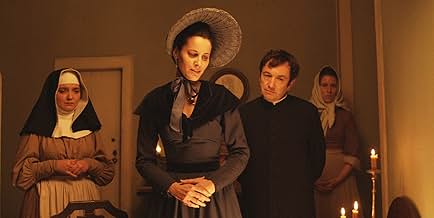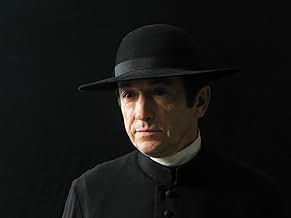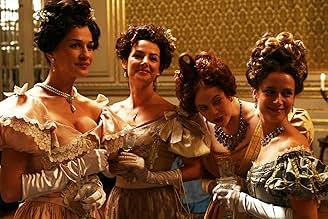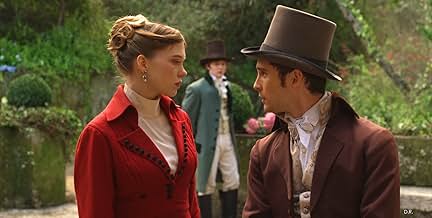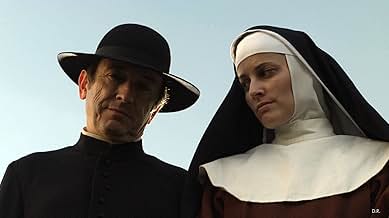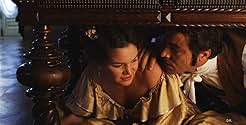IMDb RATING
7.4/10
3.7K
YOUR RATING
Follows a jealous countess, a wealthy businessman, and a young orphaned boy across Portugal, France, Italy and Brazil where they connect with a variety of mysterious individuals.Follows a jealous countess, a wealthy businessman, and a young orphaned boy across Portugal, France, Italy and Brazil where they connect with a variety of mysterious individuals.Follows a jealous countess, a wealthy businessman, and a young orphaned boy across Portugal, France, Italy and Brazil where they connect with a variety of mysterious individuals.
Browse episodes
7.43.6K
1
2
3
4
5
6
7
8
9
10
Featured reviews
10Fotodude
An experience not to be missed on the big screen
It's almost a miracle to find a film like this one in theaters nowadays. An exceptional rarity, something that reminds you that cinema like this can still be achieved. Being a period piece, and with almost 5 hours of runtime (the 15-minute intermission included), it defies almost every convention of commercial cinema. And it doesn't drag one bit; every minute of the film is required, and while it absorbs you and doesn't let go, you feel grateful for it
For those magical hours of hypnotic escapism.
"Mysteries of Lisbon" is en epic, mesmerizing adaptation of the homonym novel by Camilo Castelo Branco. It tells a series of interconnected stories set mostly in 19th century Lisbon, although the main plot is pretty much unique. In any case, the way each story leads to the other and how it all comes together towards the end is brilliant. The two main characters are Pedro da Silva and Padre Dinis; a priest and an orphan destined to form a close bond. But all characters are carefully fleshed out; apart from those two, Ângela de Lima (Pedro's mother) or Alberto de Magalhães, among others, stand out. It is the film's purpose to explore the enigmatic nature of most of these people, leaving them and coming back to them with deeply measured fluency, bringing forward through the set occasional details of their personality, frequently using voice-overs to convey their inner thoughts while staying faithful to the literary source material.
This last idea is also present in how much the act of observation matters in this film. In a great number of scenes, a lesser character is either listening to what is happening or watching that given scene from a distance, thus often adopting the viewer's external point of view. This objective is made clear through the miniaturist theater that Pedro receives as a present from his mother, a toy that Ruiz goes back to on several occasions to mark the transition between a scene and the next. It is a beautiful little trick and, in some way, it provides part of the film's complexity. This complexity is reinforced by a few ambiguous notes, some surrealist touches and of course the multiple layers of the plot.
Another remarkable aspect is the use of clear-cut sequence shots for the majority of scenes, each of those shots more impressive than the other. The film has therefore very few close-ups, something that would also contribute to create a certain distance with the viewer. Only in a couple of situations (usually of lesser significance) does Ruiz go back to a more orthodox way of shooting. But those delightfully crafted sequence shots give the film an extraordinary, almost intoxicating energy, especially when they are accompanied by the film's haunting score. That way, every shot is a wonder in terms of composition, but also as far as the lighting is concerned. Just a few marvelous examples would be the scene at the opera hall or when Alberto de Magalhães confronts another man while Padre Dinis is traveling in the calash. Indeed, this must be one of the most striking films I've had the chance to see on the big screen.
On the whole, this is a moving, tragic and awe-inspiring masterpiece. A feast for the senses, and an immediate entry in my top 50. *****
"Mysteries of Lisbon" is en epic, mesmerizing adaptation of the homonym novel by Camilo Castelo Branco. It tells a series of interconnected stories set mostly in 19th century Lisbon, although the main plot is pretty much unique. In any case, the way each story leads to the other and how it all comes together towards the end is brilliant. The two main characters are Pedro da Silva and Padre Dinis; a priest and an orphan destined to form a close bond. But all characters are carefully fleshed out; apart from those two, Ângela de Lima (Pedro's mother) or Alberto de Magalhães, among others, stand out. It is the film's purpose to explore the enigmatic nature of most of these people, leaving them and coming back to them with deeply measured fluency, bringing forward through the set occasional details of their personality, frequently using voice-overs to convey their inner thoughts while staying faithful to the literary source material.
This last idea is also present in how much the act of observation matters in this film. In a great number of scenes, a lesser character is either listening to what is happening or watching that given scene from a distance, thus often adopting the viewer's external point of view. This objective is made clear through the miniaturist theater that Pedro receives as a present from his mother, a toy that Ruiz goes back to on several occasions to mark the transition between a scene and the next. It is a beautiful little trick and, in some way, it provides part of the film's complexity. This complexity is reinforced by a few ambiguous notes, some surrealist touches and of course the multiple layers of the plot.
Another remarkable aspect is the use of clear-cut sequence shots for the majority of scenes, each of those shots more impressive than the other. The film has therefore very few close-ups, something that would also contribute to create a certain distance with the viewer. Only in a couple of situations (usually of lesser significance) does Ruiz go back to a more orthodox way of shooting. But those delightfully crafted sequence shots give the film an extraordinary, almost intoxicating energy, especially when they are accompanied by the film's haunting score. That way, every shot is a wonder in terms of composition, but also as far as the lighting is concerned. Just a few marvelous examples would be the scene at the opera hall or when Alberto de Magalhães confronts another man while Padre Dinis is traveling in the calash. Indeed, this must be one of the most striking films I've had the chance to see on the big screen.
On the whole, this is a moving, tragic and awe-inspiring masterpiece. A feast for the senses, and an immediate entry in my top 50. *****
Romantic, tasteful
This series of short stories set in a world long gone is of course a costume drama, that may therefore deter some. They would be mistaken. It is slow, considered, colorful and in my view a good introduction to the world of our ancestors, who held opinions different from ours, did things in a different way, and got upset about the same issues, yet in a different clothing. Love that is thwarted, wise padres, noble families with poor youngest children and all of that in a heavily draped world - sometimes a bit much. And yet I may recommend that you sit down, do not hurry, leave your perhaps preconceived ideas at the entrance, and enjoy these so many hours of romantic stories.
Outstanding
Well this is pretty exciting stuff, four and a half hours of Raoul Ruiz back on top form. It's an adaptation of an eponymous 19th century novel by Camilo Castelo-Branco, who is a very famous author in Portugal, the first professional Portuguese author. I think that Ruiz and Castelo-Branco may have been birds of a feather, both known for being extremely prolific artists, Castelo-Branco managed to produce over 260 books whilst this movie is Ruiz's 111th. Superficially one could compare the movie to Wojciech Has' The Saragossa Manuscript (1965) in the way, in the style of Scheherazade, stories generate out of one another. But I think, given the large level of inter-relationships between the stories (what's really being revealed is a web), a more apt comparison may be to Victor Hugo's Les Misérables.
This is quite a dark movie, it opens with the description that "this work is not my child, nor my godson... this work is a diary of suffering". The young narrator says, in comparison to the other children at the religious school he's at, "I never went on outings, nor had holidays, nor presents". His presence at the school and his identity is a mystery to him, he has no last name and is known only as "Joao". His story sprouts into others, which are generally to do with love. The movie is perverse in the extreme, there is a ball at one point in the movie which sums up the atmosphere, the musicians play weird lilting African lunduns for the guests to dance to, which is the latest fashion, along with the pointing of fingers, all the while the guests maliciously gossip. This is in marked contrast to the official Catholicism of Portugal, that one never really gets any sense of in the movie. Although ones honour and reputation may be lost by a single indiscreet kiss, honour is only a thing of extreme superficiality, to be seen as honourable is to be honourable.
The length to which love annihilates the characters in the movie is quite astonishing at times, and brought me to the brink of tears. The Duchess of Cliton is a case in point, a once innocent woman, who describes herself as "mechant", and breaks the hearts of men at will. At one point, she is manipulating a portly baron, who has been nothing but kind to her, and simply bursts out in laughter, revelling in her power. She has to leave the room and then come back. The baron is totally undeterred, just as the young man who Cliton tells she is a bad woman simply refuses to believe her. Her beauty gives her a halo and power that is sheerly wicked. There's also a lot of sexual jealousy in the movie too, and the fires of this jealousy are stoked to ruination, in a way which provokes awe.
There's a sense of romantic progression from early extreme romantic sentiments, pure love, which is shattered by heartbreak, and leads either to misery or to revenge, where the person who has had their heart broken becomes a heart breaker to regain their power. There's a kind of perversity to everything, people are always spying on events from a distance, and a place of extreme duplicity is described as a "temple to sincerity", which in a way it is.
My favourite scene perhaps is set in a grand room in the University of Lisbon, which, it is pretended, is the Portuguese embassy in Rome. Two seats are bought into a room that is bare except for the most magnificent frescoes, a conversation ensues in which one man declares his intention to withdraw from life, he is to take religious orders instead of performing a cowardly annihilation of his own body. At the end of the scene the conversant withdraws and the two chairs are taken away, the man is left with nothing but the frescoes, a metaphor for his memories, which are the only thing that remains for him of the world, he focuses on part of a fresco and collapses. This is how mise-en-scene should be! Ruiz got the director of photography to watch Time Regained and a couple of other Ruiz movies beforehand. This confirms to me a suspicion that Ruiz always maintains ultimate control over the look of the movie. Here it's all trademark shooting, with elements in the extreme foreground of the shot framing action in the background, or vice versa. The camera movements in the mostly interior scenes are also extremely intricate. It's a gorgeous looking movie. The bag of tricks comes out as well, at one point a painting comes to life when Joao looks at it, in a threatful shot that can only be described as gobsmacking.
The movie has a definite colour palette, all shades of gold mostly, with dark greens and greys, yeah it's a stunner.
There is a longer version at six hours that will shortly be screened on Portuguese television. Ruiz in fact prefers the cinema version because the TV version has to have it's tempo fiddled with so that each of the six episodes it splits into ends on something of a cliffhanger. There is also one very powerful scene included in the movie which is not on the TV series, this is where it is revealed what is behind the locked door of Father Dinis.
If you liked this, prepare yourself for more. Ruiz has declared the intention to make a sequel based on the Castelo-Branco novel "livro negro de Padre Dinis" (the black book of Father Dinis). Ruiz is unstoppable, he made this highly intricate and long movie in 14 weeks, during which time he underwent surgery! Mysteries of Lisbon is an extremely special and very significant movie.
This is quite a dark movie, it opens with the description that "this work is not my child, nor my godson... this work is a diary of suffering". The young narrator says, in comparison to the other children at the religious school he's at, "I never went on outings, nor had holidays, nor presents". His presence at the school and his identity is a mystery to him, he has no last name and is known only as "Joao". His story sprouts into others, which are generally to do with love. The movie is perverse in the extreme, there is a ball at one point in the movie which sums up the atmosphere, the musicians play weird lilting African lunduns for the guests to dance to, which is the latest fashion, along with the pointing of fingers, all the while the guests maliciously gossip. This is in marked contrast to the official Catholicism of Portugal, that one never really gets any sense of in the movie. Although ones honour and reputation may be lost by a single indiscreet kiss, honour is only a thing of extreme superficiality, to be seen as honourable is to be honourable.
The length to which love annihilates the characters in the movie is quite astonishing at times, and brought me to the brink of tears. The Duchess of Cliton is a case in point, a once innocent woman, who describes herself as "mechant", and breaks the hearts of men at will. At one point, she is manipulating a portly baron, who has been nothing but kind to her, and simply bursts out in laughter, revelling in her power. She has to leave the room and then come back. The baron is totally undeterred, just as the young man who Cliton tells she is a bad woman simply refuses to believe her. Her beauty gives her a halo and power that is sheerly wicked. There's also a lot of sexual jealousy in the movie too, and the fires of this jealousy are stoked to ruination, in a way which provokes awe.
There's a sense of romantic progression from early extreme romantic sentiments, pure love, which is shattered by heartbreak, and leads either to misery or to revenge, where the person who has had their heart broken becomes a heart breaker to regain their power. There's a kind of perversity to everything, people are always spying on events from a distance, and a place of extreme duplicity is described as a "temple to sincerity", which in a way it is.
My favourite scene perhaps is set in a grand room in the University of Lisbon, which, it is pretended, is the Portuguese embassy in Rome. Two seats are bought into a room that is bare except for the most magnificent frescoes, a conversation ensues in which one man declares his intention to withdraw from life, he is to take religious orders instead of performing a cowardly annihilation of his own body. At the end of the scene the conversant withdraws and the two chairs are taken away, the man is left with nothing but the frescoes, a metaphor for his memories, which are the only thing that remains for him of the world, he focuses on part of a fresco and collapses. This is how mise-en-scene should be! Ruiz got the director of photography to watch Time Regained and a couple of other Ruiz movies beforehand. This confirms to me a suspicion that Ruiz always maintains ultimate control over the look of the movie. Here it's all trademark shooting, with elements in the extreme foreground of the shot framing action in the background, or vice versa. The camera movements in the mostly interior scenes are also extremely intricate. It's a gorgeous looking movie. The bag of tricks comes out as well, at one point a painting comes to life when Joao looks at it, in a threatful shot that can only be described as gobsmacking.
The movie has a definite colour palette, all shades of gold mostly, with dark greens and greys, yeah it's a stunner.
There is a longer version at six hours that will shortly be screened on Portuguese television. Ruiz in fact prefers the cinema version because the TV version has to have it's tempo fiddled with so that each of the six episodes it splits into ends on something of a cliffhanger. There is also one very powerful scene included in the movie which is not on the TV series, this is where it is revealed what is behind the locked door of Father Dinis.
If you liked this, prepare yourself for more. Ruiz has declared the intention to make a sequel based on the Castelo-Branco novel "livro negro de Padre Dinis" (the black book of Father Dinis). Ruiz is unstoppable, he made this highly intricate and long movie in 14 weeks, during which time he underwent surgery! Mysteries of Lisbon is an extremely special and very significant movie.
Conversations reveal complicated pasts in this epic Portuguese novel brought to life
The Mysteries of Lisbon are not so much mysteries as they are a series of conversations which always lead to some sort of revelation. These revelations are melodramatic punch lines with interlocking characters continuously finding out who their parents are, where they came from, the results of lost loves, and everything in between. If the script was written in a linear fashion with no time jumps or flashbacks, there would be no mysteries; it would just be a meandering retelling of Romeo and Juliet (and all of their cousins).
The word meandering sounds harsh and an indictment of a script which does not know where it is going. However, I mean meandering as in there are multiple lead characters to follow and each of them has a very complicated past which takes its time to tell. The Mysteries of Lisbon is four and a half hours long; the director threw out accepted norms for audience patience in favor of showing the whole story. It is based on an 1854 novel by the Portuguese author Camilo Castelo Branco and it appears it was filmed in an unabridged fashion.
The main character is a village priest, Padre Denis (Adriano Luz), who at first is indirectly involved in a couple's forbidden love affair and then purposefully injects himself into their lives and then into everyone else's life who comes into contact with their troubles. Even though the priest is the interconnecting cog in the middle of all of these characters, he is not the narrator. That role is given to an orphan the priest looks after and becomes a driving force of his own later on.
The director, Raul Ruiz, obviously loves conversations, but only deep and emotionally scarring ones. Every conversation or recounting of a previous conversation has its own 30 minute segment it seems. The characters, usually just two, sit in a room and then the scene fades into flashback on what happened in the past which will now illuminate the present. I believe the time shifts were included to create the mystery. The author deliberately created the tension of not knowing and the 'a-ha' discovery moments because he could not have accomplished the same moments with a realistic, linear timeline.
The action is mostly set in Portugal and appears to be in the early 1800s but after Napoleon. The Emperor is frequently referenced but only in the past tense. Many of the characters are nobles so the costume designer had a true feast in outfitting so many people in remarkable period dress. The Portuguese scenery and elaborate set designs are also enjoyable; somebody really took their time to make the set look intensely real. The lighting is also employed to convey a sense of realness. There seems to be no artificial lighting whatsoever. Light only comes through windows during the day and the rooms are terrifically dark at night. The candles never flicker so there must be some source of artificiality, but it is not noticeable. Unfortunately, Raul Ruiz recently passed away on 19 August. He was Chilean born but left Chile in 1973 when Augusto Pinochet took power. The Mysteries of Lisbon is his final film and is of such epic proportions it appears he was thinking about this film for a long time before he finally took the plunge.
I recommend this film, but be careful. Watch it only if you appreciate long, intense scenes of dialogue or appreciate the intricate details of period films. There is extremely little action and drawn out sequences with no words spoken at all; however, there is character with the endearing name 'Knife Eater'. If these aspects do not scare you, then sit back and enjoy because you are in for a real treat. You will not see a film like this from an American director; no studio would ever sign off on a movie this long, not if they expect it to make any money.
The word meandering sounds harsh and an indictment of a script which does not know where it is going. However, I mean meandering as in there are multiple lead characters to follow and each of them has a very complicated past which takes its time to tell. The Mysteries of Lisbon is four and a half hours long; the director threw out accepted norms for audience patience in favor of showing the whole story. It is based on an 1854 novel by the Portuguese author Camilo Castelo Branco and it appears it was filmed in an unabridged fashion.
The main character is a village priest, Padre Denis (Adriano Luz), who at first is indirectly involved in a couple's forbidden love affair and then purposefully injects himself into their lives and then into everyone else's life who comes into contact with their troubles. Even though the priest is the interconnecting cog in the middle of all of these characters, he is not the narrator. That role is given to an orphan the priest looks after and becomes a driving force of his own later on.
The director, Raul Ruiz, obviously loves conversations, but only deep and emotionally scarring ones. Every conversation or recounting of a previous conversation has its own 30 minute segment it seems. The characters, usually just two, sit in a room and then the scene fades into flashback on what happened in the past which will now illuminate the present. I believe the time shifts were included to create the mystery. The author deliberately created the tension of not knowing and the 'a-ha' discovery moments because he could not have accomplished the same moments with a realistic, linear timeline.
The action is mostly set in Portugal and appears to be in the early 1800s but after Napoleon. The Emperor is frequently referenced but only in the past tense. Many of the characters are nobles so the costume designer had a true feast in outfitting so many people in remarkable period dress. The Portuguese scenery and elaborate set designs are also enjoyable; somebody really took their time to make the set look intensely real. The lighting is also employed to convey a sense of realness. There seems to be no artificial lighting whatsoever. Light only comes through windows during the day and the rooms are terrifically dark at night. The candles never flicker so there must be some source of artificiality, but it is not noticeable. Unfortunately, Raul Ruiz recently passed away on 19 August. He was Chilean born but left Chile in 1973 when Augusto Pinochet took power. The Mysteries of Lisbon is his final film and is of such epic proportions it appears he was thinking about this film for a long time before he finally took the plunge.
I recommend this film, but be careful. Watch it only if you appreciate long, intense scenes of dialogue or appreciate the intricate details of period films. There is extremely little action and drawn out sequences with no words spoken at all; however, there is character with the endearing name 'Knife Eater'. If these aspects do not scare you, then sit back and enjoy because you are in for a real treat. You will not see a film like this from an American director; no studio would ever sign off on a movie this long, not if they expect it to make any money.
An intriguing, fascinating film
Mistérios de Lisboa is shown in the United States with the title Mysteries of Lisbon (2010). The film is directed by the extraordinary Chilean director, Raoul Ruiz. Ruiz, who died in 2011, had directed 115 films. (Not a typo--one hundred and fifteen.)
The film is based on a novel by the Portuguese author Camilo Castelo Branco. (Unfortunately, the novel isn't available in English translation.) It's also frustrating that the DVD available in the U.S. is a shortened version of the original miniseries. (266 minutes vs. 360 minutes. What was left out of the shorter version?)
The film is hard to describe because there are stories within stories within stories. The basic plot--more or less--revolves around a boy attending a Catholic school in early 19th Century Portugal. The boy doesn't know the identity of his mother and father. He doesn't even know his last name.
We eventually meet his mother, her husband, and--in flashback--his father. We also meet elegant women in sumptuous gowns, men for whom dueling is a way of life, and endless numbers of servants who are always watching and listening.
Some mysteries are never resolved. For example, there's a young woman who is the mistress of one of the nobles. When he dies, she refuses to accept any of his inheritance. She turns up again as the wife of an extremely wealthy, cruel man. Then she disappears from the plot. (Was her story edited out, or did she just disappear?)
Ultimately, I think the key to the plot is the priest Padre Dinis, played extremely well by Adriano Luz. He--like almost all of the the characters--turns out to have a surprising past.
Other IMDb reviewers have commented on the costumes, which are incredibly attractive. Two main characters who appear in those costumes are Maria João Bastos as a Portuguese noblewoman and Clotilde Hesme as a French noblewoman. Both of them are extremely beautiful in a European, non-Hollywood way. They appear to have been born to wear those costumes.
At the very end of the movie the young man, now grown, encounters some beggars. One of them tells him, "With the nobility, it's all about their honor. We poor people know these things happen, and we take them as part of life." When I thought about it, those sentences encompasses Mysteries of Lisbon. Nobles fight duels and spend endless effort and resources to protect the honor of their family. One man goes so far as to order the killing of his grandchild, because the child is born out of wedlock. Huge events are taking place around them--the Napoleonic wars, the Portuguese civil war--but what really matters is their rigid code of honor.
We saw this movie on DVD, and it worked well enough. However, almost every frame of the film would be a beautiful still. Many scenes look like lush paintings--Baroque, rather than 19th Century. That's why I believe the film would work better on the large screen. However, if no screening is available, buy the DVD. It's not a movie you want to miss!
The film is based on a novel by the Portuguese author Camilo Castelo Branco. (Unfortunately, the novel isn't available in English translation.) It's also frustrating that the DVD available in the U.S. is a shortened version of the original miniseries. (266 minutes vs. 360 minutes. What was left out of the shorter version?)
The film is hard to describe because there are stories within stories within stories. The basic plot--more or less--revolves around a boy attending a Catholic school in early 19th Century Portugal. The boy doesn't know the identity of his mother and father. He doesn't even know his last name.
We eventually meet his mother, her husband, and--in flashback--his father. We also meet elegant women in sumptuous gowns, men for whom dueling is a way of life, and endless numbers of servants who are always watching and listening.
Some mysteries are never resolved. For example, there's a young woman who is the mistress of one of the nobles. When he dies, she refuses to accept any of his inheritance. She turns up again as the wife of an extremely wealthy, cruel man. Then she disappears from the plot. (Was her story edited out, or did she just disappear?)
Ultimately, I think the key to the plot is the priest Padre Dinis, played extremely well by Adriano Luz. He--like almost all of the the characters--turns out to have a surprising past.
Other IMDb reviewers have commented on the costumes, which are incredibly attractive. Two main characters who appear in those costumes are Maria João Bastos as a Portuguese noblewoman and Clotilde Hesme as a French noblewoman. Both of them are extremely beautiful in a European, non-Hollywood way. They appear to have been born to wear those costumes.
At the very end of the movie the young man, now grown, encounters some beggars. One of them tells him, "With the nobility, it's all about their honor. We poor people know these things happen, and we take them as part of life." When I thought about it, those sentences encompasses Mysteries of Lisbon. Nobles fight duels and spend endless effort and resources to protect the honor of their family. One man goes so far as to order the killing of his grandchild, because the child is born out of wedlock. Huge events are taking place around them--the Napoleonic wars, the Portuguese civil war--but what really matters is their rigid code of honor.
We saw this movie on DVD, and it worked well enough. However, almost every frame of the film would be a beautiful still. Many scenes look like lush paintings--Baroque, rather than 19th Century. That's why I believe the film would work better on the large screen. However, if no screening is available, buy the DVD. It's not a movie you want to miss!
Did you know
- GoofsThe movie is set during the late 1700's to early 1800's. During the ballroom scene, several shots make it obvious that the gowns worn by the women have zippers in the back but the zipper wasn't invented until 1851.
- Alternate versionsAlso exists as a shorter (by about an hour), theatrically released, feature film version, Mysteries of Lisbon (2010).
- ConnectionsEdited from Mysteries of Lisbon (2010)
- How many seasons does Mysteries of Lisbon have?Powered by Alexa
Details
- Release date
- Countries of origin
- Official sites
- Languages
- Also known as
- Лісабонські таємниці
- Filming locations
- Production companies
- See more company credits at IMDbPro
Contribute to this page
Suggest an edit or add missing content



